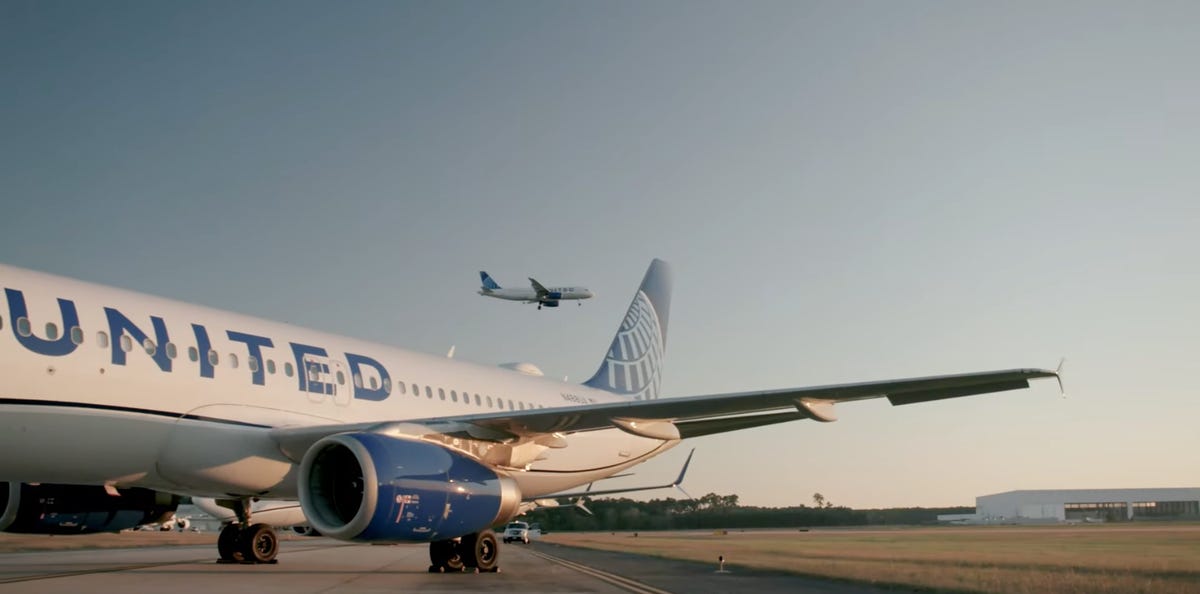United Airlines wants customers to pay for something they may find outrageous | ZDNet

United in its greenness?
Screenshot by ZDNet
If any airline has done reasonably well out of the pandemic, it’s United.
Somehow, it’s avoided being the object of too much derision — other than its fanciful claim that it’s so very hard to get Covid on a plane (so, you know, we’ll try and stuff as many passengers in as we can).
These days, the airline has led the assault on vaccine recalcitrants by insisting employees get vaccinated or lose their jobs, which seems quite boisterously sane.
Yet with confidence comes a certain potential overreach.
No, I’m not specifically talking about the way all airlines, the minute there’s some global event, beg the government for money. Many, many billions.
This little tale involves a perfectly innocent (-sounding) comment made by United CEO Scott Kirby.
Appearing on CBS‘s Face The Nation, Kirby offered many musings about, well, the nation.
He offered copious positive mutterings about the Biden administration. Sample: “I think the administration is doing a really admirable job of trying to find all the levers to push to get the whole country vaccinated, and they have really gotten better data and science.”
Alright, you might be thinking, what does he want?
The administration hasn’t, after all, decreed that all airline passengers must be vaccinated. Neither has United Airlines, oddly enough. Even though, like every restaurant near my house, it could demand proof of jabbing.
So then, why all the governmental praise? Might there be a reason?
Well, later in the interview Kirby mused about the new infrastructure passage. He’s all for it. It’d be good for America to have better airports and air traffic control — the latter of which, some way, operates on staggeringly retrograde systems.
Still, Kirby surely wants something else. And, offered the teasing question about climate change and what airlines need to do to combat it, he couldn’t help but expose himself.
“Well, particularly for the climate change initiatives, we do need government support, really, to fund the investment,” he said. “If you look at solar and wind, 20 years ago, they couldn’t compete with coal or natural gas, and today it’s cheaper. That’s because the government provided credits to give certainty to invest in the industry.”
You know it’s coming, don’t you?
“And that’s what we need for things like sustainable aviation fuel,” he added.
Airlines are an interesting lot. They send the collection plate around at every conceivable opportunity, just as they’re squeezing more and more people onto their planes and offering them the world’s tiniest lavatories.
All while cozily buying back airline shares at every conceivable opportunity.
But ask them to invest in the technological development of something important — some would say vital — and, oh no, the taxpayers, aka our customers, should pay for that.
This isn’t to minimize what’s needed to create sustainable aviation fuel. And United is most generously pledging to buy it.
I can imagine, though, that customers may chafe a touch — those Economy seats are mighty tight — at the idea that it’s they, not the airlines, who should cough up to the max, so that the world doesn’t cough itself to death.
Of course, Kirby stands beside the flag: “This really is an opportunity in America to drive investment, drive the next generation of great jobs that can be green, but also great jobs, great technology that we can export around the world.”
And of course he must surely admire how subsidies have greatly contributed to making Elon Musk mightily wealthy, if not always mightily persuasive.
But if you’re going to appear in ads touting your commitment to be green (see below), how much should you truly invest in that commitment? A little more than you do currently?
And how much should the taxpayers fund the work for you? Especially as many will fear that airlines will simply slip a few more green fees into ticket prices.
These aren’t easy questions. They’re somewhat queasy questions.
United, along with other airlines, is a member of the so-called Clean Skies For Tomorrow coalition of interested parties. But examine the rhetoric and it’s feels more about accelerating the “supply and use of SAF technologies,” not the scientific perfecting thereof.
But ensuring some kind of tomorrow ought to involve a little corporate sacrifice too, shouldn’t it? Even from an industry not always known for it.
Then again, unlike Musk, at least Kirby wants us to stay down here on Earth. That’s something.
For all the latest Technology News Click Here
For the latest news and updates, follow us on Google News.
